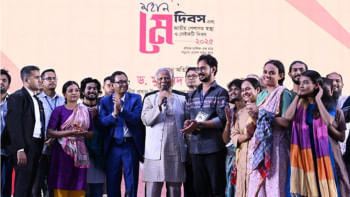Health Budget: Paltry allocations, that too unutilised

Bangladesh's healthcare expenditure is the lowest in South Asia, former governor of Bangladesh Bank Atiur Rahman said at a pre-budget webinar yesterday, demanding that the allocation for the sector be increased.
He pointed out that the expenditure (both public and private) currently make up only 2.34 percent of the country's Gross Domestic Product (GDP). "The per head expenditure is 110 US dollars, which is the lowest in South Asia. The average expenditure in South Asia is 401 US dollars."
Atiur, also the Bangabandhu chair professor of University of Dhaka, said a large proportion of the expenditure in Bangladesh is out-of-pocket expenditure, and the actual government expenditure on public health is only 0.4 percent of the GDP. "The government, however, states that it is more."
And even of this paltry share, around 24 percent of the allocations remain unutilised, he said, recommending that the budget allocation be increased to 7 percent of the national budget.
He made the remarks at the pre-budget webinar titled "Public Expenditure for Health Sector: Proposals for FY2021-22", jointly organised by Unnayan Shamannay and Bangladesh Health Watch.
Analysing the expenditure, Atiur said district hospitals in Gazipur, Mymensingh, Rajshahi and Rangpur received between Tk 0-Tk 24 per capita in healthcare budget allocation, while Cumilla, Tangail and Sylhet received between Tk 25- Tk 40 per capita.
"Because the distribution is not equitable, the district city hospitals have to tolerate additional pressure," he said.
Most of the allocation is actually spent on operational activities, and not on development.
Atiur said he found that only 19 percent was spent on medical supplies. "But since this allocation includes subsidised or free medication for the poor. This proportion should be increased.
"Within the period of the 8th Five Year Plan, this ratio needs to be raised to 10 to 12 percent."
He inferred that to avoid remaining unprepared against the second wave of the pandemic, the government and non-government actors must come together and go for wartime preparations -- and that this effort must remain unabated for the next few years.
Besides, the former BB governor stressed on allocating additional budget for vaccination so that Bangladesh can vaccinate at least 60 percent of its population in a year and urged to cut down allocations for other sectors.
He also pointed out that primary healthcare is receiving around one-fourth of the health budget. Considering that the majority of the healthcare seekers need primary care, this ratio needs to be increased to 35-40 percent of the total budget within the medium-term, he said.
Atiur also analysed the income groups of people seeking healthcare from public hospitals, and found that the poor have significantly less access to public healthcare in urban areas.
According to his findings, the richest 20 percent of the population have access to 28 percent of public healthcare, while the poorest 20 percent of the population only access 15 percent of public healthcare in urban areas.
Former Health Minister Ruhal Haque MP emphasised on decentralisation of health administration and reduction in bureaucratic delays in the health sector.
Shirin Akhter MP highlighted the need for enhancing budget implementation efficiency in the health sector.
Planning Minister M A Mannan agreed to the need for re-prioritisation of the health allocations and urged the civil society to keep pushing the health agenda.
Discussants also urged policymakers to take the lessons from universal healthcare-related pilot programmes implemented so far, and based on that, initiate full-fledged universal healthcare programs across the country.
They also highlighted the need for better coordination among the state and non-state actors involved in the health sector.
The webinar was chaired by Bangladesh Health Watch Convener Dr Mushtaque Raza Chowdhury.
MP Aroma Dutta, MP Prof Habibe Millat MP, Gonoshasthaya Kendra founder Dr Zafrullah Chowdhury, and National Professor Dr Shaila Khatun, among others, also spoke at the webinar.

 For all latest news, follow The Daily Star's Google News channel.
For all latest news, follow The Daily Star's Google News channel. 



Comments